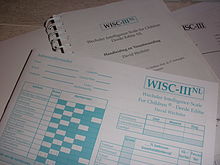David Wechsler
David Wechsler | |
|---|---|
| Born | January 12, 1896 |
| Died | May 2, 1981 (aged 85) New York City, U.S. |
| Known for | Wechsler Adult Intelligence Scale, Wechsler Intelligence Scale for Children |
| Scientific career | |
| Fields | Psychology |
David "Wex" Wechsler (January 12, 1896 – May 2, 1981) was a leading American psychologist. He developed well-known intelligence scales, such as the Wechsler Adult Intelligence Scale (WAIS) and the Wechsler Intelligence Scale for Children (WISC). A Review of General Psychology survey, published in 2002, ranked Wechsler as the 51st most cited psychologist of the 20th century.[1]
Biography
Wechsler was born in a Jewish family in Lespezi, Romania, and emigrated with his parents to the United States as a child. He studied at the City College of New York and Columbia University, where he earned his master's degree in 1917 and his Ph.D. in 1925 under the direction of Robert S. Woodworth. During World War I, he worked with the United States Army to develop psychological tests to screen new draftees while studying under Charles Spearman and Karl Pearson.
After short stints at various locations (including five years in private practice), Wechsler became chief psychologist at Bellevue Psychiatric Hospital in 1932, where he stayed until 1967.
He died on May 2, 1981.[2]
Intelligence scales

Wechsler is best known for his intelligence tests. He was one of the most influential advocates of the role of nonintellective factors in testing. He emphasized that factors other than intellectual ability are involved in intelligent behavior.[3] Wechsler objected to the single score offered by the 1937 Binet scale. Although his test did not directly measure nonintellective factors, it took these factors into careful account in its underlying theory.[4] The Wechsler Adult Intelligence Scale (WAIS) was developed first in 1939 and then called the Wechsler-Bellevue Intelligence Test. From these he derived the Wechsler Intelligence Scale for Children (WISC) in 1949 and the Wechsler Preschool and Primary Scale of Intelligence (WPPSI) in 1967. Wechsler originally created these tests to find out more about his patients at the Bellevue clinic and he found the then-current Binet IQ test unsatisfactory. The tests are still based on his philosophy that intelligence is "the global capacity to act purposefully, to think rationally, and to deal effectively with [one's] environment" (cited in Kaplan & Saccuzzo, p. 256).
The Wechsler scales introduced many novel concepts and breakthroughs to the intelligence testing movement. First, he did away with the quotient scores of older intelligence tests (the Q in "I.Q."). Instead, he assigned an arbitrary value of 100 to the mean intelligence and added or subtracted another 15 points for each standard deviation above or below the mean the subject was. While not rejecting the concept of general intelligence (as conceptualized by his teacher Charles Spearman), he divided the concept of intelligence into two main areas: verbal and performance (non-verbal) scales, each evaluated with different subtests.
The WAIS is today the most commonly administered psychological test (Kaplan & Sacuzzo, 2009). The tests are currently updated approximately every ten years to compensate for the Flynn effect.
References
- ^ Haggbloom, Steven J.; Warnick, Jason E.; Jones, Vinessa K.; Yarbrough, Gary L.; Russell, Tenea M.; Borecky, Chris M.; McGahhey, Reagan; Powell, John L., III; et al. (2002). "The 100 most eminent psychologists of the 20th century". Review of General Psychology. 6 (2): 139–152. doi:10.1037/1089-2680.6.2.139.
{{cite journal}}: Explicit use of et al. in:|last2=(help); Unknown parameter|displayauthors=ignored (|display-authors=suggested) (help)CS1 maint: multiple names: authors list (link) - ^ Wolfgang Saxon (May 3, 1981). "Dr. David Wechsler, 85, Author Of Intelligence Tests". New York Times. Retrieved 2014-08-18.
Dr. David Wechsler, a psychologist who was the author of widely used intelligence tests, died yesterday at his home on Manhattan's East Side. He was 85 years old.
{{cite news}}: Cite has empty unknown parameter:|coauthors=(help) - ^ Kaplan, R. M. & Saccuzzo, O. P. (2009). Psychological testing: Principles, applications, and issues (7 ed.), (pp. 250). Belmont, CA: Wadsworth.
- ^ Kaplan, R. M. & Saccuzzo, O. P. (2009). Psychological testing: Principles, applications, and issues (7 ed., pp 250-251). Belmont, CA: Wadsworth.
Bibliography
- Frank, George (1983). The Wechsler Enterprise: An Assessment of the Development, Structure, and Use of the Wechsler Tests of Intelligence. Oxford: Pergamon. ISBN 0-08-027973-2.
{{cite book}}: Invalid|ref=harv(help)
- Kaplan, Robert M.; Saccuzzo, Dennis P. (2009). Psychological Testing: Principles, Applications, and Issues (Seventh ed.). Belmont (CA): Wadsworth. ISBN 978-0-495-09555-2.
{{cite book}}: Invalid|ref=harv(help); Unknown parameter|laydate=ignored (help); Unknown parameter|laysummary=ignored (help)
- Kaufman, Alan S. (1994). Intelligent Testing with the WISC-III. Wiley Series on Personality Processes. New York (NY): Wiley. ISBN 0-471-57845-2.
{{cite book}}: Invalid|ref=harv(help)
- Kaufman, Alan S. (2009). IQ Testing 101. New York: Springer Publishing. ISBN 978-0-8261-0629-2.
{{cite book}}: Invalid|ref=harv(help); Unknown parameter|laydate=ignored (help); Unknown parameter|laysummary=ignored (help)
- Kaufman, Alan S.; Lichtenberger, Elizabeth (2006). Assessing Adolescent and Adult Intelligence (3rd ed.). Hoboken (NJ): Wiley. ISBN 978-0-471-73553-3.
{{cite book}}: Unknown parameter|laydate=ignored (help); Unknown parameter|laysummary=ignored (help)
- Wechsler, David (1939). The Measurement of Adult Intelligence. Baltimore (MD): Williams & Witkins.
{{cite book}}: Invalid|ref=harv(help)
- Wechsler, David (1958). The Measurement and Appraisal of Adult Intelligence (fourth ed.). Baltimore (MD): Williams & Witkins.
{{cite book}}: Invalid|ref=harv(help)
